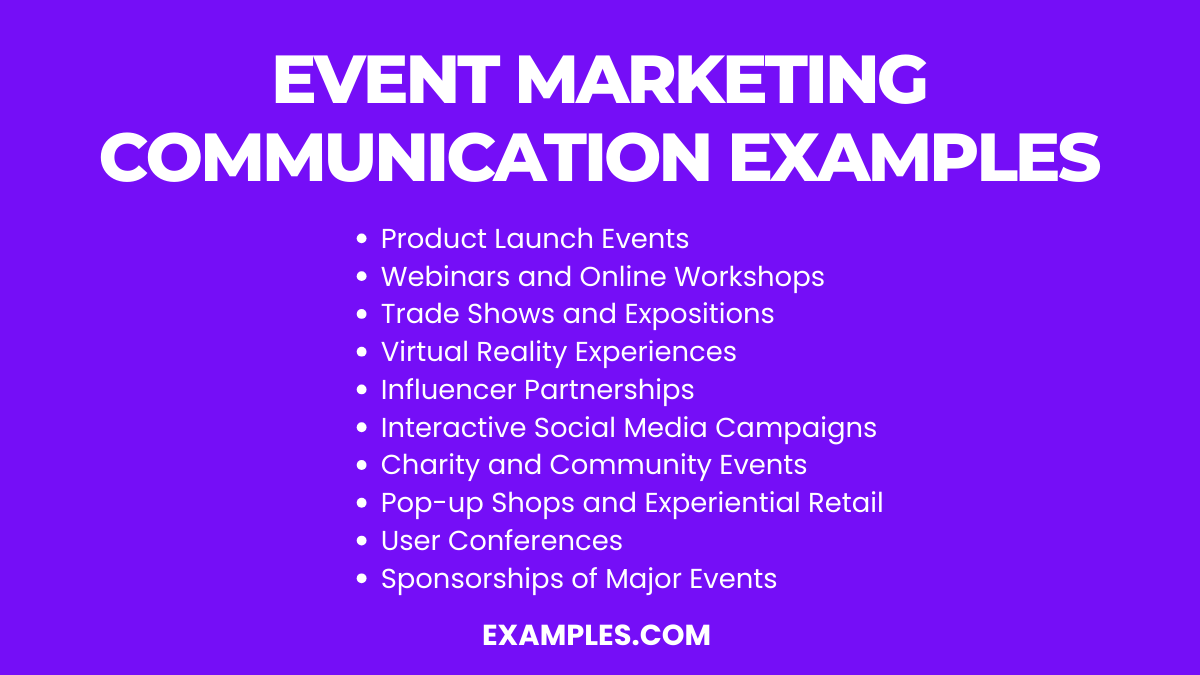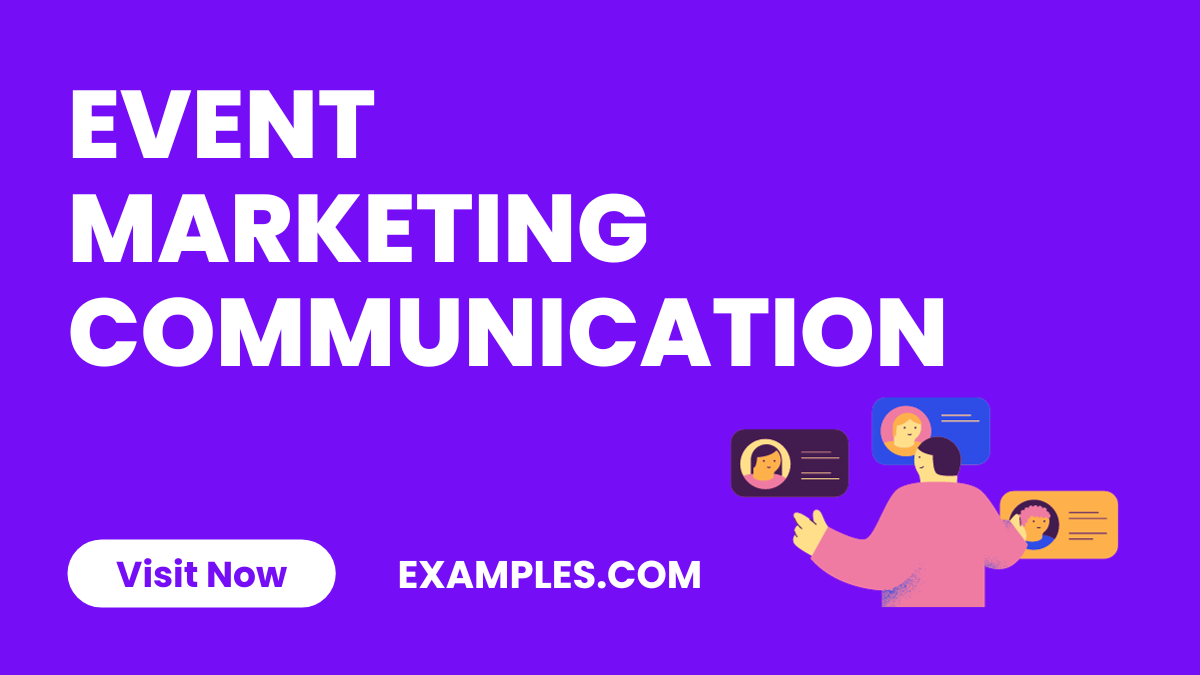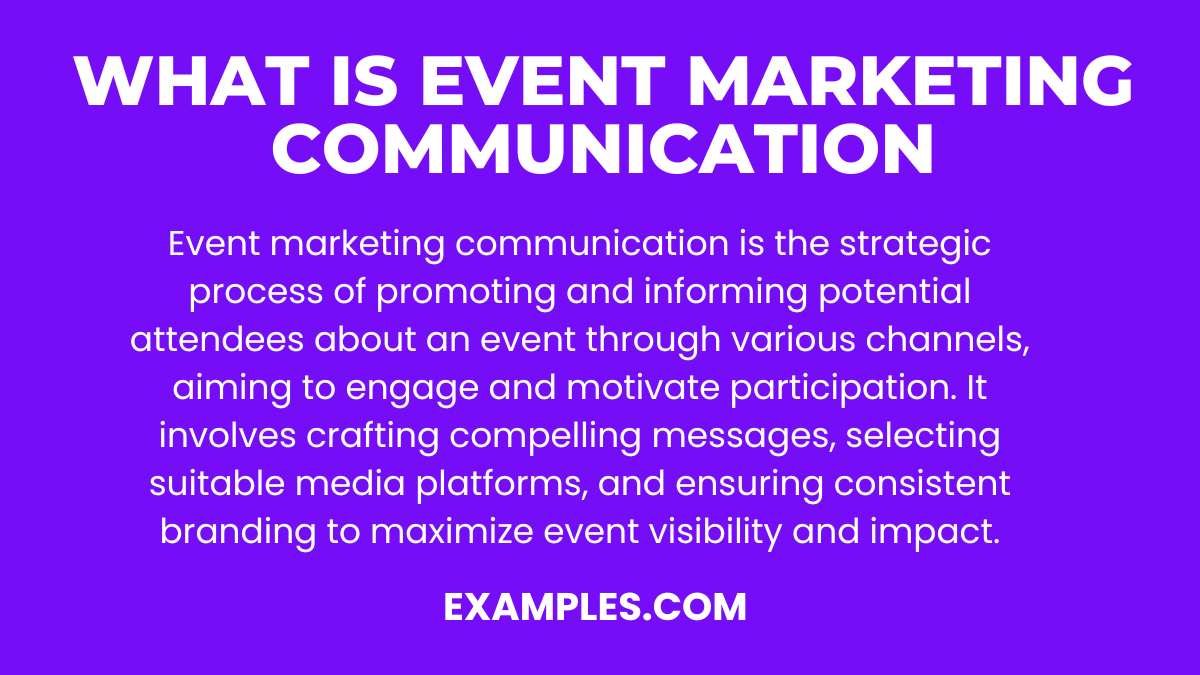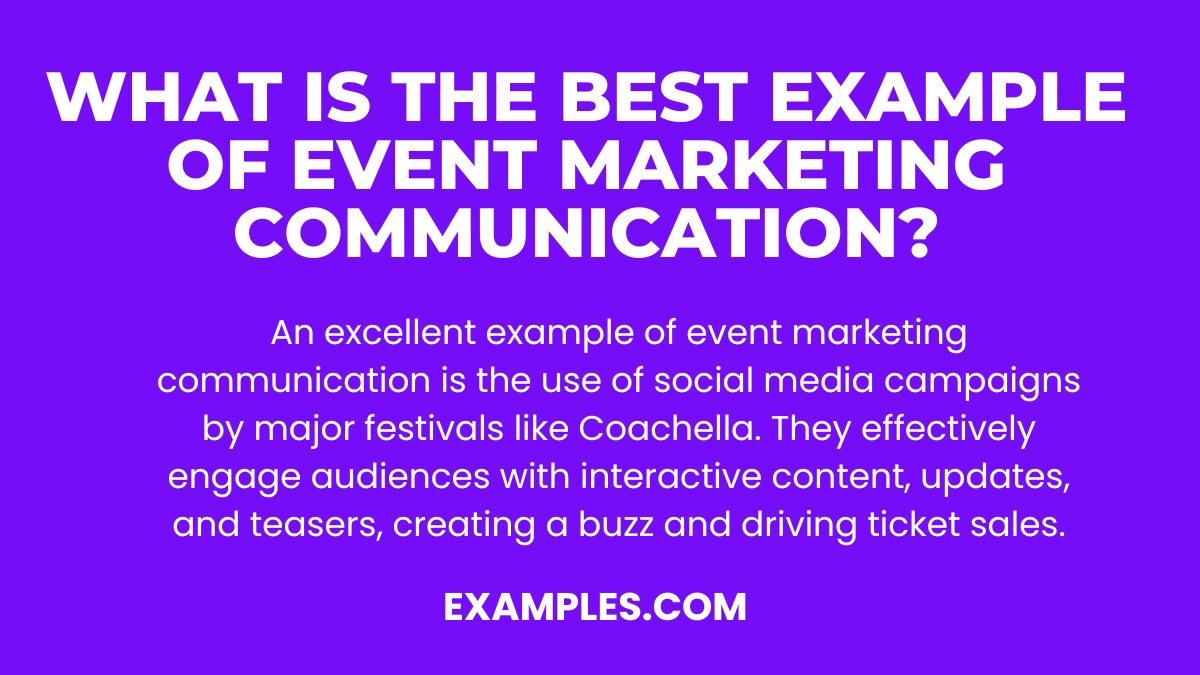20 Event Marketing Communication Examples
Event Marketing Communication is a dynamic field blending creativity with strategic planning. This comprehensive guide delves into the nuances of crafting impactful event marketing campaigns. It covers everything from initial planning to execution, with a focus on effective Communication Examples. Learn how to engage audiences, build lasting relationships, and measure the success of your events. This guide is an essential resource for marketers looking to leverage event marketing for brand growth and audience engagement, packed with practical examples and expert insights.
Importance of Communication in Event Marketing PDF
What is Event Marketing Communication?
Event Marketing Communication refers to the strategic use of events as a channel to convey a brand’s message to its audience. It involves organizing and participating in events to promote a product, service, or brand, engaging directly with attendees. This approach creates memorable experiences, fostering deeper connections between the brand and its audience. It’s an interactive form of marketing, allowing for real-time feedback and personal interactions, which are essential for building brand loyalty and awareness.
What is the Best Example of Event Marketing Communication?
A standout example of Event Marketing Communication is the Apple Keynote events. These events are quintessential for their ability to generate excitement and engagement. Apple masterfully uses these keynotes to unveil new products and updates, creating a buzz in the tech community and beyond. They expertly blend product demonstrations with storytelling, making each event a memorable experience. This approach not only showcases their products but also reinforces their brand identity and innovation leadership, making Apple Keynotes a benchmark in event marketing.
20 Event Marketing Communication Examples
Event Marketing Communication is a vibrant and impactful way to connect with audiences. It’s about creating memorable experiences and interactions that resonate with people on a personal level. From product launches to brand activations, the aim is to leave a lasting impression.

- Product Launch Events: Companies like Apple create anticipation and excitement through product launch events, attracting global attention and media coverage.
- Webinars and Online Workshops: Businesses often host educational webinars and workshops to engage with their audience and promote their expertise or products.
- Trade Shows and Expositions: Companies exhibit at trade shows to showcase products, network, and generate leads, often employing interactive displays and demonstrations.
- Virtual Reality Experiences: Brands use VR technology at events to provide immersive experiences, allowing attendees to interact with products in a novel way.
- Influencer Partnerships: Brands collaborate with influencers to host or promote events, leveraging their follower base for wider reach and credibility.
- Interactive Social Media Campaigns: Companies use social media platforms for interactive event promotions, like live Q&As, hashtags, or contests.
- Charity and Community Events: Brands often sponsor or organize community and charity events to boost brand image and give back to society.
- Pop-up Shops and Experiential Retail: Temporary retail spaces in high-traffic areas offer unique shopping experiences and generate buzz around new products.
- User Conferences: Companies host conferences for users to network, learn about new products, and provide feedback, strengthening community and loyalty.
- Sponsorships of Major Events: Brands sponsor major sports, music, or cultural events for widespread exposure and association with popular events.
- Film Screenings and Premieres: Movie studios use premieres and screenings to generate excitement and media buzz, attracting celebrities and influencers to boost visibility.
- Music and Arts Festivals: Festivals often collaborate with brands for sponsorships, providing a platform for experiential marketing and audience engagement.
- Launch Parties: Brands host exclusive parties to launch new products or services, creating an aura of exclusivity and luxury.
- Fitness Challenges and Marathons: Companies sponsor or organize fitness events to promote health and wellness, aligning with brand values and engaging a fitness-conscious audience.
- Book Readings and Signings: Authors and publishers use readings and signings to promote new releases, engaging directly with readers and fans.
- Culinary Events and Food Festivals: Food brands and restaurants host culinary events to showcase their products, offering tastings and cooking demonstrations.
- Gaming Tournaments: Video game companies host or sponsor gaming tournaments, tapping into the eSports trend and reaching a dedicated gaming audience.
- Fashion Shows: Fashion brands host shows to display new collections, often incorporating celebrities and influencers to widen appeal.
- Corporate Retreats and Team Building Events: Companies use these events for internal marketing, boosting morale and strengthening team dynamics.
- Photography and Art Exhibitions: Artists and galleries host exhibitions to showcase work, creating opportunities for sales and networking in a creative environment.
Importance of Communication in Event Management
Effective communication is the cornerstone of successful event management. It plays a pivotal role in every aspect of organizing and executing events, from initial planning to post-event feedback. Understanding its importance is crucial for professionals in the event marketing and management industry.
Ensuring Clear Goals and Objectives
Clear communication helps establish and align the goals and objectives of an event. It ensures that every team member understands the purpose, target audience, and desired outcomes. This clarity is vital for creating a cohesive event that meets its objectives.
Streamlining Coordination and Collaboration
Events often involve multiple stakeholders, including planners, vendors, sponsors, and attendees. Effective communication facilitates seamless coordination among these parties, ensuring that all elements of the event come together smoothly.
Enhancing Marketing and Promotion
In event marketing, communication is key to promoting the event effectively. It involves crafting compelling messages, choosing the right channels, and engaging with the audience to build excitement and drive attendance.
Managing Expectations and Feedback
Communication is essential for managing the expectations of attendees, sponsors, and other stakeholders. It also plays a significant role in gathering and analyzing feedback, which is crucial for the continuous improvement of future events.
Handling Crises and Changes
Events can be unpredictable, with last-minute changes and potential crises. Effective communication is critical in these situations to quickly disseminate information, make adjustments, and keep all parties informed and calm.
Building Relationships and Networking
Event management is not just about the logistics; it’s also about building and maintaining relationships. Effective communication fosters networking opportunities, strengthens relationships with stakeholders, and enhances the overall event experience
Event Agency Marketing Communications
Event Agency Marketing Communications involves specialized agencies focusing on creating and delivering communications strategies for events. These agencies harness various channels to build buzz, engage audiences, and ensure the success of events.
- Ketchum: Known for innovative event strategies, Ketchum excels in integrating public relations to maximize event exposure.
- Jack Morton Worldwide: Specializes in creating brand experiences, their events are known for immersive storytelling and creativity.
- George P. Johnson: A leader in experiential marketing, they’re renowned for creating dynamic, interactive event experiences.
- Freeman: This agency stands out for its comprehensive event solutions, including digital and virtual event strategies.
- BCD Meetings & Events: They focus on corporate event marketing, offering end-to-end services from planning to execution.
- Cvent: Known for their technology-driven solutions, they specialize in streamlining event planning and management processes.
- TBA Global: TBA Global excels in creating memorable corporate events and brand activations with a focus on engagement.
- Eventive Marketing: They specialize in consumer events, creating experiences that connect brands with their audiences.
- MKG: Known for their creative approach, MKG crafts events that are not just functions but brand stories.
- Octagon: Specializes in sports and entertainment event marketing, linking events with sponsorships for maximum impact
Event Marketing Communication Plan for Success
Creating a successful Event Marketing Communication Plan involves strategic planning and execution. It’s about identifying objectives, understanding the audience, crafting compelling messages, and choosing the right channels for dissemination. Effective plans focus on audience engagement, clear messaging, and measurable outcomes, ensuring that every aspect of the event aligns with the brand’s goals.
1. Product Launch by Tesla
Tesla’s product launches combine innovation showcases with engaging presentations, effectively communicating the brand’s futuristic vision.
2. Dove Real Beauty Campaign
This campaign used real-life stories and interactive events to redefine beauty standards, creating a powerful narrative.
3. Ben & Jerry’s Free Cone Day
An annual event offering free ice cream to customers, effectively combining product enjoyment with brand loyalty building.
4. Oprah’s Book Club
A series of events promoting literacy and discussion, leveraging Oprah’s influence to engage and educate audiences.
5. Patagonia’s Environmental Campaigns
Events focused on environmental conservation, aligning with the brand’s sustainable and ethical values.
6. Samsung Unpacked Events
These events reveal new products, incorporating technological demonstrations and celebrity endorsements for maximum impact.
7. Lego Building Events
Interactive events that encourage creativity and play, reinforcing Lego’s brand as a source of imaginative fun.
8. Netflix Pop-Up Experiences
Creating real-life experiences based on popular shows, offering fans a unique way to engage with their favorite content.
9. MasterCard Priceless Campaigns
Exclusive events offering unique experiences, emphasizing the brand’s message of creating unforgettable moments.
10. Victoria’s Secret Fashion Show
A blend of fashion, entertainment, and brand storytelling, creating a high-profile marketing spectacle
What is the Purpose of Event Marketing?
Event marketing is a dynamic and influential strategy within the broader scope of marketing communications. It serves several key purposes, each contributing to the overarching goals of brand promotion, customer engagement, and business growth. Understanding these purposes is essential for businesses and marketers aiming to leverage events for maximum impact.
Building Brand Awareness
One of the primary purposes of event marketing is to elevate brand awareness. Events provide a platform for businesses to showcase their brand, products, or services to a targeted audience. This exposure is crucial for introducing new offerings, reinforcing brand identity, and staying top-of-mind among consumers.
Engaging with the Target Audience
Events offer a unique opportunity for direct engagement with the target audience. This interaction is more personal and impactful compared to other marketing channels. Through live demonstrations, interactive sessions, and face-to-face conversations, businesses can create a memorable experience that fosters a deeper connection with their audience.
Generating Leads and Sales Opportunities
Events are potent tools for lead generation and sales. By attracting an audience that is already interested in the industry or topic, businesses have a higher chance of converting attendees into leads and customers. Events also provide an ideal setting for networking, building partnerships, and identifying new market opportunities.
Establishing Thought Leadership
Hosting or participating in events positions a company as a leader in its field. By sharing expertise, insights, and innovative ideas, businesses can establish themselves as authoritative voices, earning respect and credibility among peers and potential customers.
Collecting Feedback and Market Insights
Events are excellent for gathering valuable feedback and market insights. Direct interaction with attendees allows businesses to understand customer needs, preferences, and trends, which can inform future marketing strategies and product development.
Enhancing Customer Relationships and Loyalty
Events can strengthen customer relationships and loyalty. By providing an engaging and valuable experience, businesses can leave a lasting positive impression on their audience. This engagement helps in retaining existing customers and turning them into brand advocates
Techniques of Event Marketing Communication
Event Marketing Communication encompasses a variety of techniques designed to engage audiences and promote brands in a dynamic and interactive way. These techniques range from immersive experiential events to strategic social media campaigns, each tailored to create a unique and memorable brand experience. They leverage creativity, technology, and personalization to connect with audiences on a deeper level, ensuring that each event not only reaches its target audience but also leaves a lasting impact.
1. Virtual Reality Experiences
Creating immersive virtual environments that allow attendees to interact with a brand in a novel and engaging way.
2. Live Streaming of Events
Broadcasting events in real-time to a global audience, expanding reach and engagement beyond physical locations.
3. Interactive Workshops and Seminars
Offering hands-on experiences that educate and engage attendees, fostering deeper connections with the brand.
4. Brand Activations at Public Events
Setting up interactive booths or experiences in public spaces to attract and engage passersby with the brand.
5. Influencer Collaborations
Partnering with influencers to leverage their audience and credibility, enhancing the event’s appeal and reach.
6. Social Media Challenges and Contests
Creating buzz around events through social media challenges or contests, encouraging audience participation and engagement.
7. Augmented Reality Features
Incorporating AR elements into events for an enhanced and interactive attendee experience.
8. Pop-Up Events in Unexpected Locations
Surprising the audience with pop-up events in unique locations, creating a sense of exclusivity and excitement.
9. User-Generated Content Campaigns
Encouraging attendees to create and share content related to the event, increasing organic reach and engagement.
10. Post-Event Engagement Strategies
Continuing the conversation post-event through follow-up content, surveys, and special offers to maintain engagement and measure impact
What are the 5 C’s of Event Marketing?
The 5 C’s of event marketing are crucial concepts for successful event marketing communication: Concept (the event’s central idea), Coordination (organizing all elements), Control (managing logistics and contingencies), Culmination (execution of the event), and Closeout (post-event activities and analysis). These elements ensure a comprehensive and effective approach to event marketing
What are the 5 Essential Features of Event Marketing?
Essential features of event marketing include engaging content, interactive experiences, clear brand messaging, audience targeting, and measurable outcomes. It combines creativity with strategic planning to create memorable brand interactions.
Event marketing plays a crucial role in event management. It involves strategies to promote an event to a target audience, aiming to increase awareness and encourage participation. Key functions of event marketing include identifying the target audience, crafting compelling messages, choosing the right channels for promotion (like social media, email marketing, and advertising), and measuring the effectiveness of marketing efforts. Event marketing also entails creating a strong brand for the event, engaging potential attendees through various platforms, and ensuring a consistent message across all marketing materials. This approach helps in building excitement, driving attendance, and ultimately contributing to the success of the event.





